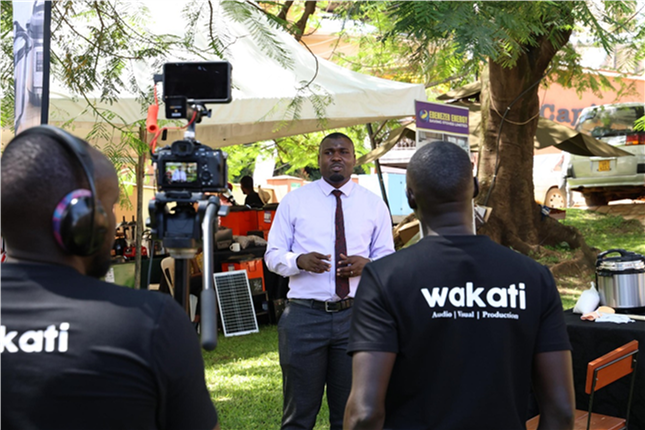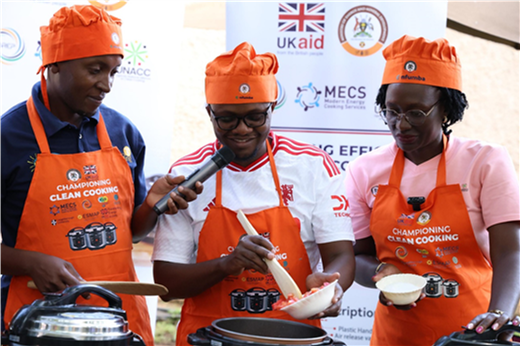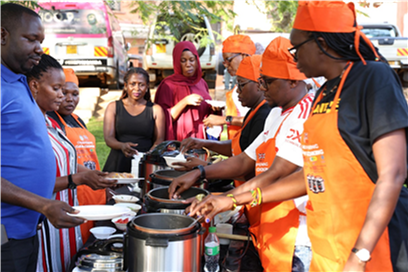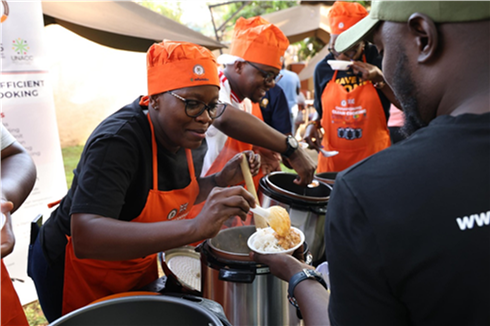On a vibrant afternoon of April 11th, 2025, in Kampala, the Capital FM Group Clean Cooking Demonstration brought together radio media professionals, clean energy advocates, and technical experts for a hands-on experience with Electric Pressure Cookers (EPCs). Organized by the National Renewable Energy Platform (NREP) with support from the Ministry of Energy and Mineral Development (MEMD), the event aimed to debunk myths, promote the adoption of electric cooking solutions, and connect stakeholders with practical tools that save time, energy, and improve health outcomes.
Dr. Crispus Tashobya, Carbon and Green Finance Expert at MEMD, opened the event with a powerful interview that emphasized the economic and environmental promise of EPCs. What made this event unique was its interactive approach; the radio staff took the lead in preparing traditional Ugandan dishes using EPCs, making clean cooking personal and relatable. With participants from Capital FM, Beat FM, and MEMD, the event turned cooking into a conversation about health, sustainability, and empowerment.

Key Highlights & Observations
The demonstration kitchen buzzed with excitement as media professionals took on the role of chefs. Godfrey Kyobe (Sales Manager, Beat FM) prepared molokonyi(cow hooves), Patricia Osman (Head of News, Capital FM) prepared beef, Ruth Lenia (Accounts Receivables, Capital Radio) prepared Matooke, Benz Mary (Accounts Manager, Capital Radio) prepared vegetable rice, and Edward Himbisa (Sales Manager, Capital Radio) prepared dry beans.
As the EPCs quietly worked their magic, the atmosphere filled with curiosity and shared stories. Edward Himbisa’s experience stood out. He noted that molokonyi, a dish he loves so much, usually takes an entire day to prepare using a charcoal stove, but can be prepared in just one hour using an EPC. He expressed how this would ease cooking for his wife and mother and committed to purchasing an EPC by the end of April.
Dr. Nicholas Mukisa delivered a practical demonstration on using EPCs for mingling posho and millet (kalo), while sharing success stories from other communities. He underscored that live demos offer more impact than online messages because people can see, question, and connect. He noted that one participant was so convinced by what she saw that she insisted on purchasing the EPC used in the session.
This fusion of expert insight and community participation made the event not just informative but deeply engaging, turning skeptics into believers and observers into adopters.

Key Challenges & Lessons Learned
While enthusiasm was high, affordability emerged as a key challenge. Many attendees, especially from lower-income backgrounds, expressed the need for flexible payment options such as subsidies, pay-as-you-go models, or installment plans to make EPCs more accessible.
Another important lesson was the power of familiar voices. Watching trusted radio personalities cook traditional dishes using modern appliances created a relatable and inspiring experience. This combination of peer influence and practical demonstration proved far more persuasive than traditional outreach methods.
Dr. Mukisa’s emphasis on live interaction as a critical tool for behavioral change resonated strongly. Word-of-mouth, rooted in real experiences, was highlighted as a powerful catalyst for scaling clean cooking adoption.


Conclusion
The Capital FM group Clean Cooking Demonstration, led by NREP, successfully bridged policy with practice, using personal stories and practical experiences to make electric cooking real and relevant.
Moving forward, NREP plans to expand these interactive engagements, collaborate with financial partners to develop accessible financing models, and continue leveraging media personalities as clean energy champions. With sustained community outreach and support, electric pressure cooking can become not just a clean alternative but the new cultural norm, transforming health, saving time, and protecting the environment across Uganda.


